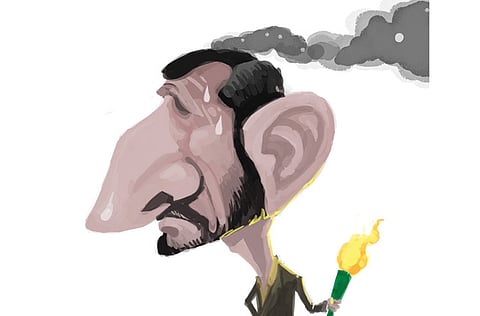Future tense for Ahmadinejad
The Iran president has few cards in his hands and not too much power to wield

It took Mahmoud Ahmadinejad until the final days of his eight-year presidency to realise that serious human rights violations were underway in the Islamic republic of Iran and that came only when one of his top aides was jailed for speaking his mind. After failing to stop the imprisonment of his media adviser, Ali Akbar Javanfekr, the president tried to embarrass hardliners in charge of the judiciary by announcing an imminent plan to visit the notorious Evin Prison and make sure the rights of inmates were fully respected. His opponents saw this as a bold initiative laden with political motives and moved quickly to bar him access to the prison and from making any political scores ahead of the presidential election in May 2013.
In his typical fashion, Ahmadinejad took the opportunity to lash out at his rivals in the Islamic regime, accusing them of trying to strip him of his presidential responsibility to uphold Iranians’ constitutional rights. But impassioned as they are, such arguments hold little water with many Iranians who blame Ahmadinejad for the bloody crackdown on pro-democracy protests, following the disputed 2009 election and widespread torture practised in the country’s prisons. The president has since tried to exonerate himself from guilt, but few believe his latest offensive against hardliners is out of genuine concern for human rights.
The row over Evin Prison, where scores of journalists and human rights activists are still being held and mistreated, is the latest in a series of bitter confrontations between Ahmadinejad and his adversaries controlling key centres of power in the Islamic republic, including the judiciary, parliament and the Revolutionary Guards. Defeated at almost every turn and reduced to a lame duck, Ahmadinejad is now trying to cultivate a liberal and democratic image in order to garner popular support and neutralise his enemies. But this strategy may have come too late as he has only a few more months in office and is barred by constitution from running for a third term. Moreover, the Iranian economy is in shambles due largely to his own mismanagement and effects of international sanctions over Iran’s nuclear ambitions, which Ahmadinejad has vehemently promoted. The situation has now reached a critical point where the president seems to be hanging to power only through the reluctant support of his onetime passionate mentor, Ayatollah Ali Khamenei, Iran’s omnipotent supreme leader. If not for Khamenei’s subtle backing, the president would have been bumped out of office long ago through parliamentary impeachment. But in the heat of international pressure and deepening economic and political crisis, Khamenei has urged his followers in parliament to hold their punches, wishing to see a smooth transition to the next administration which he hopes will be presided by a more reliable and less mercurial president.
During the 2009 presidential election, Khamenei put his entire prestige on the line for Ahmadinejad, firmly supporting him against the more democratic-minded rival Mir Hussain Mousavi. But the president has been less than grateful, challenging the supreme leader on several instances and even leaving his job for two weeks at one point in protest. Such bullheadedness has cost Ahmadinejad many friends in key positions in the Islamic regime and many have openly voiced regret for helping him rise to power. However, the maverick politician is unrepentant and he seems to be jockeying to maintain power in the post-election era by putting a close ally in his place. That is an absolute necessity given that his supporters were routed out of parliament in the previous legislative elections. “Politics is in my blood,” Ahmadinejad said recently. “I can’t let go of it even if I want to.”
In the meantime, the president has gone on the offensive to discredit his main two rivals, two brothers who control the parliament and the judiciary and both of whom are loyal followers of the supreme leader. In a recent press conference, Ahmadinejad blamed the speaker of the parliament, Mohammad Javad Larijani, for the chaotic state of the economy which has seen the value of the rial fall to a record low, with inflation and unemployment rising to alarming levels. And last week, after being refused entry to Evin Prison, the president attacked the other brother, the judiciary chief, in a harsh open letter and made a veiled threat to reconsider the judiciary’s future budget. But bold and ruthless as Ahmadinejad is in targeting his enemies, he has few cards in his hands and not too much power to wield against his opponents. So it remains to be seen if Ahmadinejad will score any points against his opponents in the months remaining until the election, or whether he will end up with the same grim fate as other political insiders who dared to challenge the supreme leader’s absolute powers. So far Ahmadinejad has been saved by the political prudence exercised by Khamenei, but the Ayatollah may loosen the leash on his opponents once he leaves office. Many of those fallen from grace had not gone half as far as Ahmadinejad has in defying authority and they did not have his guts and willingness to take risks. But they still ended up either imprisoned, confined to house arrest or silenced to nonentities. The most recent examples of these fallen stars are — once-flamboyant former president Akbar Hashemi Rafsanjani, former prime minister Mousavi and former speaker of the parliament, Mehdi Karroubi.
Balali is a journalist and writer living in California. His novel Houri was recently published in New York.


